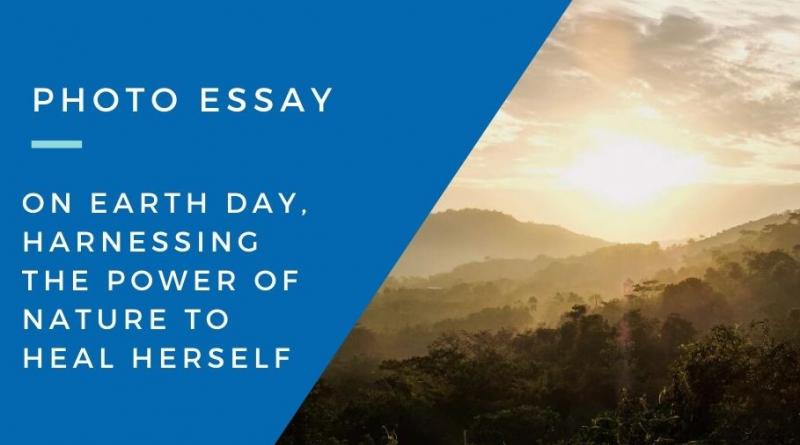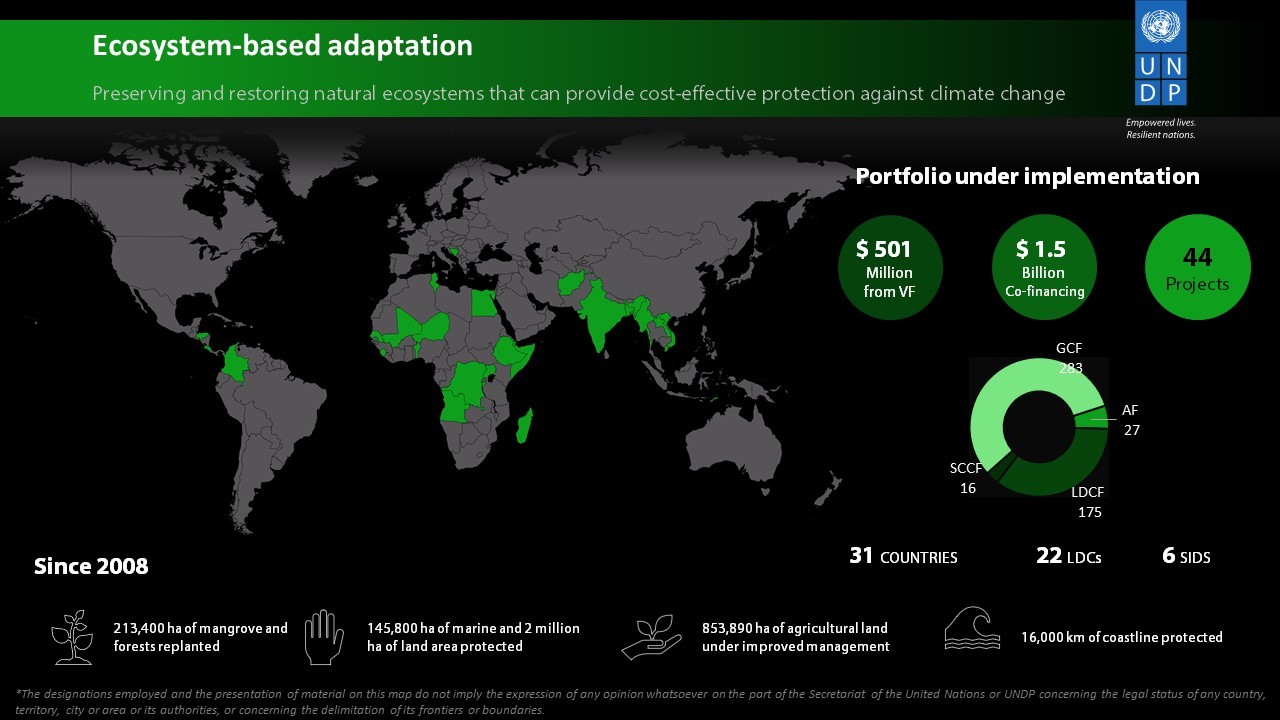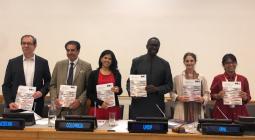On Earth Day, harnessing the power of nature to heal herself.

NATURE FIRST
Following Mother Nature’s lead through ecosystem-based adaptation
Mother Nature has provided us with all the tools we need to protect humanity from the violent and life-threatening spread of viral pandemics, rising seas, extreme weather, spiking temperatures, degraded habitats, uncontrolled wildfires and other catastrophes built from the sheer avarice of the human race.
If only we would listen.
One of the best tools she’s provided us with is the very ecosystems we are destroying. With decades of experience in the field, UNDP is now bringing some of the world’s pioneering ecosystem-based climate change adaptation actions to scale.
On Earth Day, we look at how nations across the globe are harnessing the power of Mother Earth to heal herself and to protect her people from interconnected global crises that threaten to push millions into poverty, trigger mass migration, fuel ever-more powerful disease outbreaks such as the COVID-19 pandemic, and undermine efforts to reach the Sustainable Development Goals by 2030 through the United Nation’s Decade of Action.

Impact
In the last decade, UNDP’s ecosystem-based adaptation portfolio – made possible with over half a billion dollars in finance from the Adaptation Fund, Global Environment Facility and Green Climate Fund – has supported governments in replanting over 213,000 hectares of mangrove and forest, and protecting over 2 million hectares of land, 16,000 kilometers of vulnerable coastline and 145,000 hectares of marine habitat. These efforts to harness the power of nature to protect humankind have also brought 853,800 hectares of agricultural land under improved management, and improved lives and livelihoods of 25.5 million vulnerable people living on the frontlines of our global climate crisis
"We live near the Bay of Bengal, therefore we have to contend with cyclones like Sidr, Aila, Nargis and Mahasen. The mangroves save us from such devastating disasters. At the same time, they act as a nursing and feeding ground for fish, absorb carbon, and protect land from erosion, increasing biodiversity - the value of which cannot be converted into cash." Ismail Hosen Bangladesh
Why are ecosystems so important?
Human, economic and social development relies on the health of natural habitats. Our earth powers industries, provides fresh water, food, shelter and reliable sources of livelihoods and incomes. Ecosystems can significantly reduce the impact of floods, catastrophic storms and serious droughts, and can offset vast amounts of the world’s CO2 emissions.
Ecosystem-based approaches – such as replanting mangroves, protecting wetlands, regenerative agriculture, and holistic ridge-to-reef approaches – are smart business. Investing in nature-friendly livelihoods enhances the resilience of vulnerable communities and reinforces the protection and management of the ecosystems to buffer against climate change impacts.
The numbers are impressive. A mangrove and intact reef can be an important source of protection to vulnerable coastal communities from rising tides and extreme weather events. They work in a similar way to costly ‘grey’ infrastructure, such as sea walls. They are natural infrastructure, which is not only more cost effective to maintain but also provides essential services to sustain local livelihoods.
In fact, coral reefs reduce the annual expected damages from storms by more than US$4 billion. The natural regeneration process of ecosystems results in negligible maintenance costs and often provides important co-benefits in the form of income and ecosystem services.
Integrated water resources management is key to guarantee ecosystem services. Taken from an ecosystem-based approach, this includes provisioning fresh water, regulating water purification, and supporting freshwater regeneration, among other activities. Properly managed watersheds have improved capacity to filter and absorb water generated in extreme storms. Ecosystems like wetlands are effective at filtering sediment and pollution, providing a key service for improved water quality.
Reliable access to water is vital for communities to maintain safe hygiene protocols – such as hand washing – the most powerful and simple prevention method against the spread of many diseases, including COVID-19.
Many experts note that the wild animal trade and habitat loss are the root causes of the COVID-19 pandemic. Humans invade tropical forests and other wild landscapes, which house a rich diversity of flora, fauna, and of course, viruses. The pandemic will likely take hundreds of thousands if not millions of lives globally, and could cost a total of more than US$9 trillion in economic losses
Protecting nature, and leveraging nature- and climate-based solutions to power sustainable economic development will be key to the future of our people and our planet. As such, biodiversity conservation and regeneration, natural resources protection and sustainable use, as well as resilience to climate change must be central to the COVID-19 crisis recovery efforts and future development planning.
Scaling up ecosystem services
Pioneering ecosystem-based adaptation actions yielded significant benefits which need to be taken to scale. One stunning example comes from Colombia
“I have guavas, lemons, oranges, tangerines, coconuts, passion fruits, chilies, eggplants, yuccas, yams and rice. We raise the areas under cultivation so that they are not flooded. Alternatively, we make circular gardens by digging ring-like ditches. The arable part is in the centre, elevated and protected from the water. In this way, the soil conserves humidity during the dry season.” Zoila Guerra, Colombia
Colombia piloted ecosystem-based adaptation approaches following the devastating floods of 2010 with a UNDP-supported Adaptation Fund-financed project designed to put sustainable ecosystem management at the center of disaster risk reduction by promoting healthier watersheds, protecting communities from floods and supporting poor rural populations to overcome water scarcity during prolonged dry seasons.
Early on in the project, the role of women was considered pivotal. In ensuring resilience and sustainability, women acted as community leaders in the restoration activities, lead trainings, supported nurseries and headed seedbanks of local resilient crops.
Building on the successes of the pilot, a new Scaling Up Climate Resilience Project funded by the GCF is continuing this work. Among its various efforts to promote climate-resilient agriculture, the project works with local communities to identify and reintroduce native crops that had fallen into disuse despite being more resistant to erratic rainfall and high temperatures – providing a local means for resilience.
To ensure long-term resilience and sustainability, the project is also developing community-managed seedbanks. To date, more than 80 native species have been preserved in the seedbanks As a direct result of improved access to a greater variety of plants and seeds, the food on families’ table is more diverse, supporting improved nutrition, food security and health.
"These adaptation measures are of great importance for the implementation of the National Climate Change Policy, since these activities contribute directly to promote agricultural, forestry and fisheries production systems more adapted to high temperatures, droughts or floods, to improve competitiveness, income and food security, especially in vulnerable areas and achieve a low carbon and climate resilient rural development" - Jose Fancisco Charry Director of Climate Change and Risk Management, Ministry of Environment and Sustainable Development, Colombia.
Cross cutting
Nature-based solutions are essential to overcome the main challenges of our time, from climate change and biodiversity loss to inequality and poverty. Creating a prosperous future for all requires a healthy planet. That's why ecosystem services play an integral role across UNDP's global nature, climate and energy portfolio.
Ecosystems and Biodiversity. UNDP is proactively addressing biodiversity loss and ecosystem degradation to maintain natural capital intact, through a large portfolio of over 300 projects over 130 countries. These national projects currently support improved management of 382 million hectares of biodiversity rich terrestrial ecosystems, and 196 million hectares of marine ecosystems. The country level work is supported by a range of innovative and cross-cutting global programmes including: the Biodiversity Finance Initiative (BIOFIN), The Lion’s Share initiative, and the Nature for Development Programme that encompasses the Equator Initiative, the NBSAP Forum and New York Declaration on Forest Secretariat, as well as the Green Commodities Programme (GCP) and the BES-Net Facility. The GEF Small Grants Programme (SGP) supports community-based actions in 125 countries.
Energy. Collecting firewood for cooking can be a significant driver of deforestation. Half of the world – 3 billion people – rely on firewood, charcoal or other polluting fuels for cooking, at considerable cost for people and planet. It's estimated that 3.8 million die every year from illnesses linked to smoke from open fire or stoves. UNDP and its partners aim to implement a comprehensive approach to promote clean cooking. In Nigeria for instance, where firewood collection is one of the country's main drivers of deforestation, UNDP and UN-REDD+ are supporting the country's efforts to improve community-based woodland management, while promoting a set of alternative clean energy solutions for cooking. This approach ensures that local communities can still access the crucial forest resources they need in a sustainable way, while reducing the demand for fuelwood
Climate and Forests. The forests of Paraguay have some of the highest deforestation rates in the world. Since 2011, partners across the UN System, including UNDP, have collaborated closely to reduce greenhouse gas emissions and deforestation through a range of tailor-made initiatives through REDD+. These wide-ranging partnerships are now producing results. In 2019, Paraguay reported 26.7 MtCO2 of emission reductions – or a reduction of nearly 50 per cent for the forest sector. More broadly, UNDP supports over 20 countries across the three major tropical forest areas (Amazonia, Congo and South East Asia) to advance forest-based solutions to climate change and ensure sustainable and equitable development paths that lead towards carbon neutrality.
Waters and Oceans. UNDP supports countries to achieve integrated, climate-resilient, sustainable and equitable management of water and ocean resources, as well as universal access to safe water supplies and sanitation facilities. UNDP works in co-operation with other UN agencies, donors, international financial institutions, regional organizations, NGOs, the private sector and others to improve water and ocean management and sustain livelihoods at local, national, regional and global scales through effective water and ocean governance. In addition to enhance the recovery response to COVID-19, project interventions are directed to improve local economies through sustainable fisheries, integrated water resources management actions and others. In building back better from the COVID-19 pandemic, this will improve access to markets and support vulnerable producers and fishers to obtain better prices.
The future
“We ourselves were destroying this world, but now we have a project of environmental education, we work with all the schools and are linked to the population. Here you can breathe a healthy world.” - María Teresa, 54, Cuba.
Ecosystem-based adaptation and nature-based solutions will be key to support countries in accelerating the ambitions of Nationally Determined Contributions to the Paris Agreement.
Nature-based solutions can deliver one third of the cost-effective CO2 mitigation needed through 2030. These solutions also integrate well into
actions through the Super Year of Biodiversity and the New Deal on Nature.
Taken from a 50,000-foot vantage point, these solutions not only provide chances to end poverty and hunger, but also provide support to the SDGs on good health and well-being, clean water, innovation, sustainable cities, and life below water and on land.
By empowering dynamic women leaders such as Mayra Monge in Costa Rica and Zoila Guerra in Colombia, this new generation of projects is also supporting global goals toward gender equality, reduced inequalities, and decent work and economic growth.
“The coming of the project was at the right time because there were indicators of a looming crisis in food production, household income and sustenance of livelihoods. Poor climate led to poor harvest which was largely caused by degradation of Limoto Wetland. This was an indicator of the need to look for answers and preach the solution to all residents.” Job Nalimbatya, Farmers Association Coordinator, Uganda
Pillars of success
- Integrating ecosystem services and climate-informed biodiversity rehabilitation/regeneration as part of national and sub-national resilience strategies or development plans.
- Protecting coastal communities, fisheries and marine ecosystems from climate change impacts, particularly disaster risks through nature-based solutions, such as mangrove restoration, coral reef rehabilitation, and marine protected areas.
- Harnessing finance from the private sector, insurers and financial institutions for enhancing ecosystem services at scale to adapt to climate change impacts.
- Building socio-ecological resilience to reduce climate change induced migration - including income and livelihood security, food sovereignty and disaster risk reduction.
- Halting or reversing land degradation and desertification through sustainable land management practices, including ecosystem restoration and protection.
- Promoting sustainable productive landscapes – including for resilient commodities – through regenerative agriculture measures, agro-forestry, climate- informed protected areas, and integrated water resource management.
- Fostering integrated, climate resilient, sustainable and equitable management of water and ocean resources as substantial foundations for national strategies, development plans and budgets.
- Building resilient livelihoods – Ecosystem-based adaptation (EbA) provides multiple benefits in terms of poverty alleviation through nature-friendly and climate-resilient livelihood opportunities, often proactively involving marginalized groups and women. Examples include sustainable fisheries, climate-resilient farming and market crops, zero-deforestation commodities, etc.
Engaging in participatory approaches that empower communities to invest in ecosystem services protection and sustainable management of natural resources
*Read the original article here
22 April 2020
UNDP



